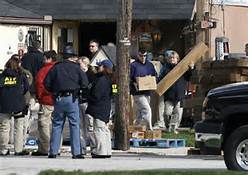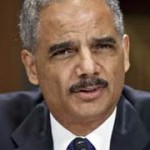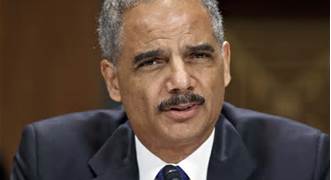Well who is B. Todd Jones anyway and why does he matter? Well he is now the Director of Alcohol. Tobacco and Firearms and he replaced Kenneth Melson after the ATF gun-walking scandal. Jones is a PC progressive lawyer and has not taken any measures to understand how rogue the ATF has become. There was Operation White Pistol, Operation Fast and Furious and then there was Operation Fearless which operated in several states.
Once again today, hearing rooms in Congress were busy today, one filled with B. Todd Jones and the House Oversight Committee drilling Jones on this operation.
This case included armed felons, mentally challenged people, stolen goods and school safe zone violations. At least the aggressive questions were bipartisan.

Read on and try to keep your jaw from dropping.
Congressional members slam ATF director in hearing on gun stings
http://www.jsonline.com/watchdog/watchdogreports/atf-director-to-testify-face-questions-on-botched-stings-b99237201z1-253538291.html#ixzz2xnDfENRs
Washington, D.C. — In his first appearance before Congress as ATF director, B. Todd Jones faced blistering bipartisan questioning Wednesday about mistakes and failures in undercover storefront operations in Milwaukee and across the nation.
Republicans and Democrats alike ticked off myriad problems in the operations: letting armed felons leave the storefronts, locating operations near schools and other safe zones; an agent having his guns stolen; paying such high prices for guns that firearms came straight from stores; and buying stolen goods, including police officers’ guns.
Members of the Committee on House Oversight and Government Reform hammered Jones the hardest on the agency’s use of people with mental disabilities to promote the operations and then arresting them, something that occurred in Milwaukee; Wichita, Kan.; Portland, Ore.; Pensacola, Fla.; and Albuquerque, N.M.
Those problems were all revealed in a Milwaukee Journal Sentinel investigation that began with an examination of a troubled storefront sting in Milwaukee’s Riverwest neighborhood. The ongoing reporting has prompted an internal ATF review, an investigation by the U.S. Justice Department’s inspector general and on Wednesday the second of two congressional hearings.
Jones told the committee that the U.S. Bureau of Alcohol, Tobacco, Firearms and Explosives does not “target people with developmental disabilities,” adding that agents didn’t know the people had mental disabilities.
Congressional members were skeptical.
“You don’t think that your agents, dealing with a man with an IQ in the 50s, knew he was mentally disabled?” asked U.S. Rep. Tammy Duckworth (D-Ill.).
U.S. Rep. Kerry Bentivolio (R-Mich.), a former teacher who taught children with disabilities, said people with low IQs are easy to spot.
“Anyone with any life experience can ask simple questions,” he said. “I was surrounded by these kids. They are some of the best, nicest people who try their best and just want to please. I am appalled you would use these individuals like this and arrest them later.”
Said Jones: “Hindsight is 20/20.”
At the hearing, Jones acknowledged it was a mistake for ATF agents to pay two teens in Oregon — one with an intellectual disability — to get tattoos depicting Squids smoking joints.
Jones said several times that the mental capacity of the low IQ individuals did not surface until raised by defense attorneys in court, saying they were part of the argument for lighter sentences. However, in several cases evaluations were done and IQ tests administered, according to court records. And federal prosecutors agreed that the individuals had diminished capacity.
The director also said his agency has not implemented training for agents on how to identify such people, more than a year after a Journal Sentinel investigation revealed a Milwaukee man with an IQ of 54 was hired by ATF to promote the store and then was charged. He was paid in cigarettes, merchandise and cash.
U.S. Rep. Michelle Lujan Grisham (D-New Mexico) said such training has been used by other law enforcement agencies for a decade.
“I am flabbergasted they are not available to you, that you are not utilizing them,” she said.
Director admits flaws
In nearly three hours of testimony, Jones admitted deep problems in the stings, especially Milwaukee’s Operation Fearless, but added the storefront technique, if done properly, has value.
He said new procedures — drafted in the wake of Operation Fearless — will prevent such problems from recurring. The agency has refused to release any documents related to any new policies or to describe all the reforms that were put in place.
Jones added no such storefront operations are underway.
“We have hit the pause button on storefronts so we can get them right. Now, if we can’t do them right, we won’t do them,” Jones said. “Unless there is an intelligence purpose for it — other than to generate numbers — we aren’t doing them.”
Echoing ATF news conferences to tout numbers when various storefront operations closed, Jones then ticked off the number of guns seized and people arrested in the half-dozen flawed operations.
Committee Chairman U.S. Rep. Darrell Issa (R-Calif.) said such numbers fail to distinguish if the guns were purchased by ATF agents shortly after they were bought at stores, and they don’t detail the kinds of individuals arrested.
“This was about pumping up the number of weapons and the number of arrests,” Issa said after the hearing.
Issa and other members of Congress has been demanding documents for more than a year on the Milwaukee sting. Last month, Issa issued a subpoena for those and from stings in other cities. The deadline was Monday, but Issa said the documents have not been received.
In the hearing, Jones said he was not briefed on Operation Fearless — though the agency has said the case was briefed at headquarters several times.
“It did not migrate up the food chain,” Jones said.
Stories prompted changes
The Milwaukee operation was included in the Monitored Case Program, one of the reforms made following the ATF’s highly criticized “Operation Fast and Furious,” where agents allowed thousands of guns to flow into Mexico, with some ending up at murder scenes, including that of a slain U.S. border guard.
Jones said changes have been made to the Monitored Case Program as a result of the Milwaukee operation.
Jones did not reveal whether anyone has been disciplined as a result of Operation Fearless or any of the other flawed operations.
U.S. Rep. Jason Chaffetz (R-Utah) questioned why Jones put two key supervisors responsible for Operation Fearless — Bernard “B.J.” Zapor and Fred Milanowski — in top positions in the Phoenix Field Division.
“Here we have the Phoenix office, probably the highest profile on the heels of Fast and Furious, and yet this same person was in charge of an office that executed Operation Fearless,” Chaffetz said. “Where is the accountability?”
Jones defended the decision.
“The movements were made for very good reasons based on their record of performance. That is not to excuse the mistakes made in Operation Fearless,” Jones said.
Jones was pressed on how much the storefront operations cost. He did not provide numbers on Wednesday, frustrating several members asking him about it.
“What we need to find out is how much was spent on these 37 storefronts,” said U.S. Rep. Jackie Speier (D-Calif.) “We need better accountability.”
Speier also asked if the storefront operations generated crime and if agents were overpaying for guns.
Jones said prices paid for guns were in line with the black market prices. The Journal Sentinel investigation found agents knowingly bought guns that were coming straight from stores, including one in Milwaukee where agents paid $2,000 for a rifle purchased from Gander Mountain for $700 the same day. Records show agents immediately traced the gun as coming from the store.
Jones said generating crime is always a concern with such storefront operations, adding agents count on local law enforcement to tell them if it is happening. In Pensacola, the Journal Sentinel found, agents were openly buying stolen goods, leading to increased burglaries in the area.
In Atlanta, agents bought guns that were stolen from Atlanta police officers,and never told the local police department about other stolen guns they had bought, resulting in local police searching for weapons that the ATF already had, the Journal Sentinel found.
Under questioning by U.S. Rep. Doug Collins, (R-Ga.), Jones could not say if the stolen police guns were ever returned.
“Did you look over this case before you came here today?” Collins asked. “Are you aware that the Atlanta Police Department expended considerable resources, interviewing witnesses in an attempt to recover the weapons because the ATF agents did not report the guns as recovered? Why didn’t the ATF return the guns to the Atlanta Police Department?”
Jones did not have an answer. He also didn’t know if his agency had a policy to notify other law enforcement agencies if agents buy a stolen police gun.
“I may be stepping out of bounds to say for certain we do, but I would be surprised if we did not have a policy,” Jones said.
As the hearing wrapped up, committee members wanted additional answers and requested another hearing with Jones. No date was disclosed.
“We just can’t let this happen again,” said U.S. Rep. Blake Farenthold (R-Texas) of the many problems.







